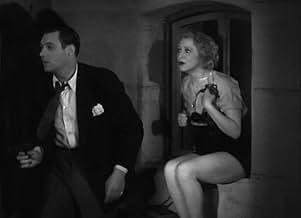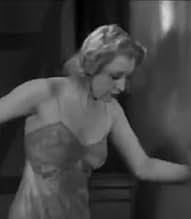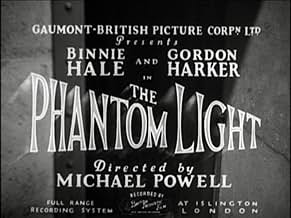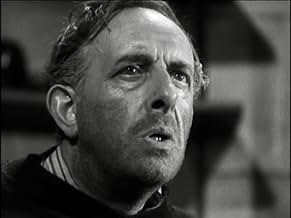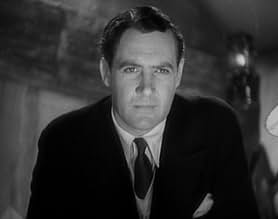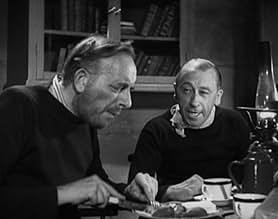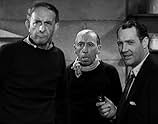AVALIAÇÃO DA IMDb
6,1/10
706
SUA AVALIAÇÃO
Adicionar um enredo no seu idiomaA lighthouse keeper has been murdered in mysterious circumstances and, during the ensuing investigation a Phantom Light keeps appearing at the scene of his death.A lighthouse keeper has been murdered in mysterious circumstances and, during the ensuing investigation a Phantom Light keeps appearing at the scene of his death.A lighthouse keeper has been murdered in mysterious circumstances and, during the ensuing investigation a Phantom Light keeps appearing at the scene of his death.
- Direção
- Roteiristas
- Artistas
Anthony Holles
- Mr. Mason
- (não creditado)
Ernest Jay
- Railway Worker
- (não creditado)
Vi Kaley
- Woman in Pub
- (não creditado)
John Singer
- Cabin Boy
- (não creditado)
Avaliações em destaque
The Phantom Light is directed by Michael Powell and adapted from the Joan Roy Byford and Evadne Price play The Haunted Light. It stars Gordon Harker, Binnie Hale, Donald Calthrop, Milton Rosmer, Ian Hunter and Herbert Lomas. Cinematography is by Roy Kellino and music by Louis Levy.
Harker stars as lighthouse keeper Sam Higgins, who gets more than he bargained for when he takes up employment at the North Stack Lighthouse out on the foggy Welsh coast.
Some time before he formed half of the classic film making partnership with Emeric Pressburger, Michael Powell was a 1930s purveyor of the "quota-quickie" British movie. Not many of those films remain in print, thankfully this delightful blend of comedy and suspense is now in home format circulation. Out of Gainsborough Pictures, The Phantom Light harks back to a wonderful time of sincerity in film making, the acting mannerisms are as correct as the dialect (it's so nice to hear the term Michaelmas used), the locale is beautifully realised and maximum dramatic impact is garnered from the minimalist settings (three parts of the film is set in the lighthouse itself). Powell proves to be adept at eking out eerie atmospherics from the story, aided superbly by Roy Kellino's photography, while it's no small triumph to actually blend the comedy with the drama and not hurt the flow of the film.
Tan-y-Bwlch and lummee, what a night!
It's not perfect by any stretch of the imagination, Hale is annoyingly high pitched and shoe-horned into the fray, though her beautiful legs go up to her armpits and distract the red blooded amongst us, and the actual turn into the suspense realm comes, considering the running time, a bit too late in the story. But the faults are actually minor ones and they don't ultimately affect the enjoyment on offer for the classic film fan. It very much can be seen as a precursor and influence to the great Will Hay pictures, Ask A Policeman & Oh! Mr. Porter, and if you want links away from the thematics and plotting? Which are joyously similar, then Herbert Lomas was in Ask A Policeman and Louis Levy scored both. It doesn't have the slapstick that dominated the Hay movies, here the wit is dry and neatly pitched as polar opposites are thrust together under one lighted roof, but this is more a light hearted thriller than a comedy drama. With excellent locations used (Devon/Wales), and a director taking his early tentative steps to greatness (yes you read right), it's a film that has enough reasons to check it out regardless of story. As it is, it's pretty darn good anyway. And I'll be back to say the same thing after my next viewing at Michaelmas. 7.5/10
Harker stars as lighthouse keeper Sam Higgins, who gets more than he bargained for when he takes up employment at the North Stack Lighthouse out on the foggy Welsh coast.
Some time before he formed half of the classic film making partnership with Emeric Pressburger, Michael Powell was a 1930s purveyor of the "quota-quickie" British movie. Not many of those films remain in print, thankfully this delightful blend of comedy and suspense is now in home format circulation. Out of Gainsborough Pictures, The Phantom Light harks back to a wonderful time of sincerity in film making, the acting mannerisms are as correct as the dialect (it's so nice to hear the term Michaelmas used), the locale is beautifully realised and maximum dramatic impact is garnered from the minimalist settings (three parts of the film is set in the lighthouse itself). Powell proves to be adept at eking out eerie atmospherics from the story, aided superbly by Roy Kellino's photography, while it's no small triumph to actually blend the comedy with the drama and not hurt the flow of the film.
Tan-y-Bwlch and lummee, what a night!
It's not perfect by any stretch of the imagination, Hale is annoyingly high pitched and shoe-horned into the fray, though her beautiful legs go up to her armpits and distract the red blooded amongst us, and the actual turn into the suspense realm comes, considering the running time, a bit too late in the story. But the faults are actually minor ones and they don't ultimately affect the enjoyment on offer for the classic film fan. It very much can be seen as a precursor and influence to the great Will Hay pictures, Ask A Policeman & Oh! Mr. Porter, and if you want links away from the thematics and plotting? Which are joyously similar, then Herbert Lomas was in Ask A Policeman and Louis Levy scored both. It doesn't have the slapstick that dominated the Hay movies, here the wit is dry and neatly pitched as polar opposites are thrust together under one lighted roof, but this is more a light hearted thriller than a comedy drama. With excellent locations used (Devon/Wales), and a director taking his early tentative steps to greatness (yes you read right), it's a film that has enough reasons to check it out regardless of story. As it is, it's pretty darn good anyway. And I'll be back to say the same thing after my next viewing at Michaelmas. 7.5/10
I didn't expect much from this obscure film and that was the right approach.
The film's pace is a big letdown - it's consistently slow from beginning to end. The scriptwriters couldn't have been bothered with the development of the story, as it is never made clear what is going on.
Gordon Harker does quite well and tries his best to enliven the proceedings but it's all in vain.
Superficially, this is just another of the many British comedy/dramas from the era. It has a characteristic manner: a fellow with a humorous take on life, a pretty girl, some intrigue and danger.
What sets this apart are two things.
The first is the setting in Wales, or more precisely among the Welsh. Its an odd sort or layering for me since I think the 30's era English are as different, strange, quaint to me as the Welsh are shown here from the English. The language is emphasized in the setup, first half of the movie. They surely are depicted as alien. At the end, there's a clear balance between evil Welsh and noble ones that come to the rescue. The chief villain of course, the ringmaster, is English of course. That Imperial undercurrent!
The second interesting thing is that the action, about 3/5s of the movie, takes place in an actual lighthouse, most at night. What an amazing challenge this must have been; there are no studio shots that I could discern. Its a small, curved structure with no opportunity to anchor the frame against a wall. There's lots of movement across different levels, as there must be, and some clever (from a staging point of view) movement from inside to outside. I suppose the director made up much of how this appears as he went along.
Ted's Evaluation -- 2 of 3: Has some interesting elements.
What sets this apart are two things.
The first is the setting in Wales, or more precisely among the Welsh. Its an odd sort or layering for me since I think the 30's era English are as different, strange, quaint to me as the Welsh are shown here from the English. The language is emphasized in the setup, first half of the movie. They surely are depicted as alien. At the end, there's a clear balance between evil Welsh and noble ones that come to the rescue. The chief villain of course, the ringmaster, is English of course. That Imperial undercurrent!
The second interesting thing is that the action, about 3/5s of the movie, takes place in an actual lighthouse, most at night. What an amazing challenge this must have been; there are no studio shots that I could discern. Its a small, curved structure with no opportunity to anchor the frame against a wall. There's lots of movement across different levels, as there must be, and some clever (from a staging point of view) movement from inside to outside. I suppose the director made up much of how this appears as he went along.
Ted's Evaluation -- 2 of 3: Has some interesting elements.
First off there is a very nice DVD of this mixed with some other British Thrillers. Looks and sounds good. That's great because the movie isn't too gripping and would dissolve with any distractions. The movie is an odd mix of "silent" movie acting and a long set up that takes up way too much time. The welsh village is fun and interesting--there are other later British films that have this same kind of small village opener with a stranger appearing and a mystery being resolved. It's a formula that works more often than not. But the movie fails to really evoke much spookiness of the lighthouse itself. It's never interested in generating any suspense for very long. Usually there is some very brief suspense moment, and it's just to set up more comedy. The comedy is fairly funny but no real sense of danger is generated. No sense of the story moving forward. There are also touches from (then trend setting) Russian montage editing that seem kind of comical in an unintended way. As you'd expect from director Powell there are a few nice camera moves and some good location photography. A music score would have helped this film there is none at all, perhaps a cost saving element? Or just a wrong choice? There are things to enjoy here but you have to get over the 30's cliché elements of "flapper girl" and "spunky-male-reporter" and these are pretty creaky indeed. A movie that, perhaps in a very director Michael Powell way, flirts around with various quirky and occasionally unexpected ideas but doesn't commit to any of them enough to become a whole anything. Other reviews of it being an OK time killer are valid.
In '30's British films I've always liked the mix of pithy Music Hall humour, mild ghostliness, a frisson of sex, and manly London chaps saving the day, all displayed perfectly in the Phantom Light. Director Michael Powell's best stuff was yet to come of course, but this can be seen as him still learning his craft practising with more inconsequential trifles.
Gordon Harker here shines with some cracking comedy lines handed to him, as the new lighthouse-keeper at a rather ... insular Welsh coastal village, apparently 200 years behind the times with Wrecking ships on the rocks still big business. Ian Hunter is the manly Londoner with all the brains ... er, I think this was his last British film until after the War ended. He was the best King Richard Hollywood ever had! Until the last reel Binnie Hale has no brains but admirably compensates with long legs. Herbert Lomas perfects the character he particularly re-used later in Ask a Policeman and The Ghost Train - he was even back in Powell & Pressburger's I Know Where I'm Going! But the film that borrowed the most from this was Arthur Askey's Back Room Boy from '42, it even looked the same inside the lighthouse!
A pleasant 75 minutes spent in the company of familiar faces and story.
Gordon Harker here shines with some cracking comedy lines handed to him, as the new lighthouse-keeper at a rather ... insular Welsh coastal village, apparently 200 years behind the times with Wrecking ships on the rocks still big business. Ian Hunter is the manly Londoner with all the brains ... er, I think this was his last British film until after the War ended. He was the best King Richard Hollywood ever had! Until the last reel Binnie Hale has no brains but admirably compensates with long legs. Herbert Lomas perfects the character he particularly re-used later in Ask a Policeman and The Ghost Train - he was even back in Powell & Pressburger's I Know Where I'm Going! But the film that borrowed the most from this was Arthur Askey's Back Room Boy from '42, it even looked the same inside the lighthouse!
A pleasant 75 minutes spent in the company of familiar faces and story.
Você sabia?
- CuriosidadesWhen Alice Bright (Binnie Hale) remarks that she had just been performing in a play, Sam Higgins (Gordon Harker) retorts, "East Lynne?" This is a reference to the oft produced play and movie of Mrs. Henry Wood's novel of the same name. "East Lynne" was enjoyed for its mad plot and frequently incomprehensible dialogue.
- Erros de gravaçãoSam Higgins arrives at Tan y Bwlch to take a boat to the North Stack lighthouse offshore. Both places exist but are about 60 miles apart. Tan y Bwlch is on the shore of a reservoir, not the sea, and North Stack lighthouse, on the isle of Anglesey, is onshore, not off.
- Citações
Alice Bright: Mr Higgins. I'm going to tell you the truth. I'm an actress, hiding from the police.
Sam Higgins: What, you act as bad as all that?
- ConexõesFeatured in Made in England: The Films of Powell and Pressburger (2024)
Principais escolhas
Faça login para avaliar e ver a lista de recomendações personalizadas
Detalhes
- Tempo de duração
- 1 h 16 min(76 min)
- Cor
- Proporção
- 1.37 : 1
Contribua para esta página
Sugerir uma alteração ou adicionar conteúdo ausente

